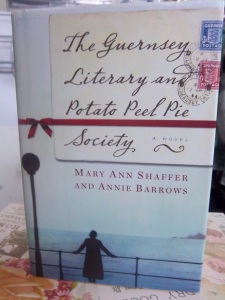[This is an older draft I’m polishing up and publishing. Exhibit Q of how the more I love a book, the harder it is to write the review, because I don’t think I’ll do it justice without slipping into mush. Also, I wrote this whole post and lost it, and am now really frustrated.]
I think most people have by this point heard of The Guernsey Literary and Potato Peel Pie Society, by Mary Ann Shaffer and Annie Barrows. Sometimes I think I put off reading oft-mentioned books because I’m afraid to be disappointed by the build-up, but this one lives up to the hype 110%.
 I’ve tried a few times unsuccessfully to write this review, and usually end up just rereading parts of the book instead, so I’m going to do things a bit differently. Here is a list of things I liked about the book and why.
I’ve tried a few times unsuccessfully to write this review, and usually end up just rereading parts of the book instead, so I’m going to do things a bit differently. Here is a list of things I liked about the book and why.
- WWII setting: I’ve always been fascinated by this time period as a backdrop, perhaps because all the terrible things happening still allow the true strength of humanity to shine through. In this case, I had no idea about the German occupation of Guernsey. (To be honest, I don’t think I could have even told you that it was an island. Despite a lot of reading, my knowledge of British geography remains shamefully jumbled.) It’s amazing to think that they were cut off from the rest of England during the war.
- epistolary format: When a book written in letters is well done, it changes my attitude towards first-person from tolerance to delight. The letters allow glimpses into the characters as they reveal their thoughts and dreams, and the nuances of their different relationships with each other. They vary from careful reflection to the heat of emotions in the moment. I wish that written correspondence with more than 140 characters was still popular today.
- tone: As one would expect from being set immediately after the war looking back, the book has it’s fair share of tragedy; however, the overall impression is that the characters all exhibit remarkable irrepressibility and hope. I would love to be friends with Juliet and Sidney. It’s also easy to see why Elizabeth with cheerful determination was the center of the little circle on Guernsey. The book also has a gentle humor, from Juliet’s witty charm to the zany Isola. It’s one of those special books that just makes you smile, despite the sections that might bring tears to your eyes.
- research: Part of the plot and structure of the book relies on anecdotal incidents, and I’m left wondering how much is based in fact. Mary Ann Shaffer mentions in the afterword that she spent years researching the occupation of the Channel islands after learning about it on a visit to Guernsey. I’m tempted to look into historical resources more myself; this site seems to have some good options. I’m sure the real island residents were just as resilient as those described here. It might be fun to try to make potato peel pie as well.
- bookishness: As the title would suggest, books are woven throughout the narrative: central in that Juliet is a writer, and that a common love for Charles Lamb is the reason she and Dawsey first correspond, but also in more subtle ways. Fiction and non-fiction alike allow characters to retain their humanity in troubling times, and also provide a lens through which they view themselves and the world.
I must have reread almost the entire book by this point, and I’m sure that this is one I will treasure and reach for again throughout my life.